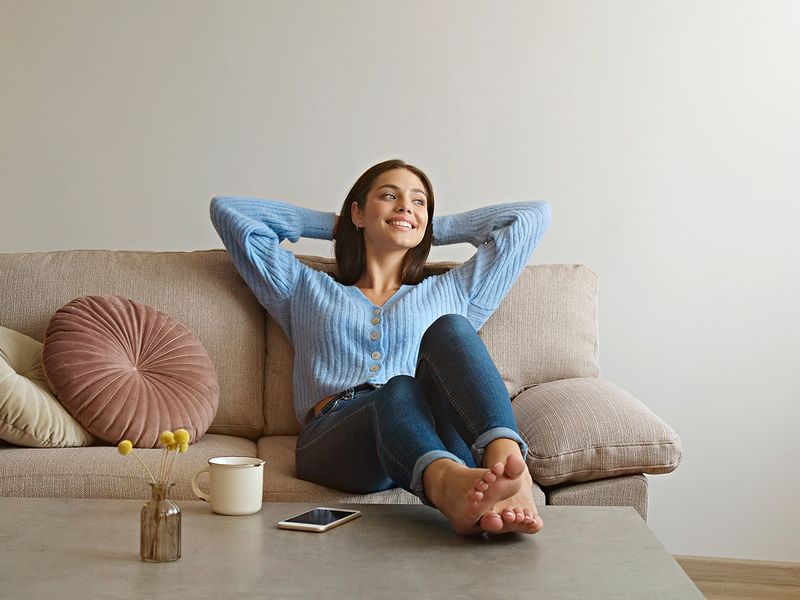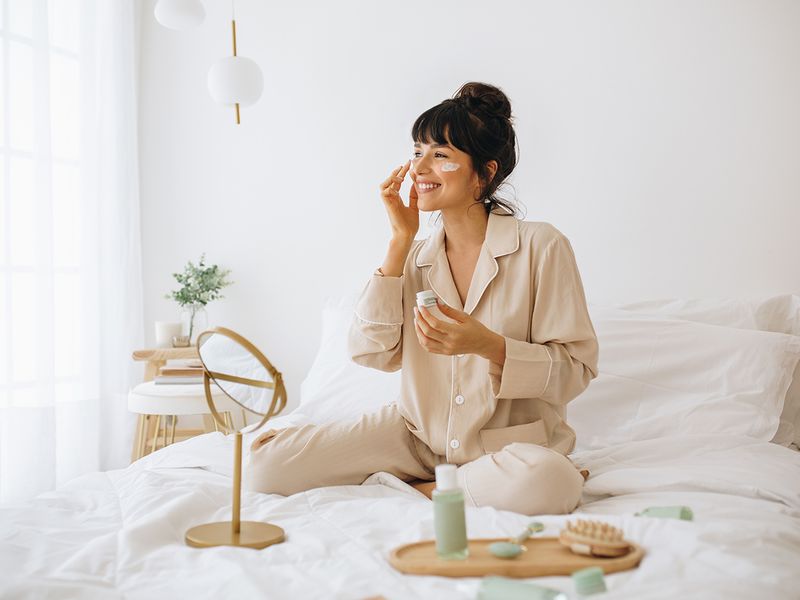
What does comfort mean to you?
Maybe, it’s lying in bed, listening to the rain falling on your window, or losing yourself in a book with your pet nestled next to you. Perhaps it’s a bowl of steaming noodles, music that lifts your spirits, or binging a favourite show. You could be comforting yourself after a difficult conversation with your boss. Or maybe, pampering yourself after a week of doing everything for everyone else. You are rewarding yourself for reaching a goal.
Ready, set, pause.
It feels good, but quite often, it isn’t truly self-care, despite how many people interpret it. Sleeping in all day and indulging in your favourite snacks may feel satisfying, but here’s the reality—it rarely helps address real problems and, if done impulsively, can even hold you back from facing them, as Dubai-based psychologist Sharika Ashraf explains. “I’ve heard people telling others that they had a ‘self-care’ day, when they would go get massages, facials, nails done, or just spend time alone, as they’re really stressed about work. It might seem beneficial, but the truth is, they eventually return to reality, and once again they feel the same anxieties that they did before. They’re just as stressed, and sometimes even guilty for taking much time off.” As she points out, a lot of these activities are just ‘self-comfort’. “You’re not caring for yourself; you’re just investing time in something that might even give you more trouble in future,” she says.
So, if you really want to feel better, rather than a temporary, relief, it’s crucial to know the difference between self-care and comfort.
Self-care is more than a quick fix

At its core, self-care has purpose. It’s intentional and is a conscious effort to engage in activities that protect your mental, physical and emotional health, explains Ashraf. It’s far more than quick fixes: It requires a certain level of discomfort and dedication.
For example, building an exercise routine is rarely comfortable at first, but the benefits are undeniable, notes Rosaline George, a clinical psychologist based in Dubai. Exercising is a powerful step toward improving both physical and mental well-being. “If you’re new to it, the thought of getting up early for a quick workout or squeezing one in after work can feel overwhelming," she explains. "But over time, you start noticing the effects—it sharpens your mental clarity and boosts your confidence." Self-care also includes setting boundaries, learning to say ‘no,’ and managing stress in healthy, constructive ways.
Don’t look for immediate rewards either, just like you would get from a comforting activity, warn the specialists. “For instance, cooking a nutritious meal at home after a long day requires more effort than ordering in. However, by preparing that meal, you are investing in long-term health, energy, and even self-esteem. Similarly, going for a run or journaling your emotions can be challenging at the start, but the sense of accomplishment and well-being afterward is a reward in itself,” adds George.
When you indulge in self-care, you show up for yourself. You make a choice that isn’t easy and comfortable, yet you know that it will make your life better. It could be something as basic as refusing to take work home after clocking out.
It could even be finishing something that you had once started. Indira Dev, a Dubai-based homemaker recalls that after shifting from India to UAE, she spent days just wallowing in self-pity and ‘uneasy’ comfort. “I was upset about the move, and to comfort myself, I was just eating easy-to-go snacks, fried and lots of sugary foods. It felt great for the moment, but later, I would feel so guilty, because I could see myself wasting away. So, I decided to take up a comfort hobby, and an unusual one: The saxophone. I bought one, much to my husband’s shock, and went for classes.” She found it difficult; it began to feel frustrating, after the initial comfort had worn off. “So, I gave up, thinking that I couldn’t learn a musical instrument.” Yet, the sight of the saxophone collecting dust in the house was too much to bear.
It was a matter of a personal victory for her, when Dev summoned the energy and determination to pursue the saxophone again, even if it led to regular complaints from her neighbours. “I wanted to do it, because I loved music, and I thought why should some complications hold me back? And then, playing, practising every day, became a matter of my self-care regime. It was a win.”
Comfort: A soothing retreat

Yet, as beneficial self-care is, it doesn’t mean that comfort doesn’t have its virtues. “It’s about relaxation and ease,” explains Casey Mills, a Dubai-based clinical psychologist. “It’s a break from the pressures of life. It’s immediate; a mental and physical escape.”
No doubt, most of these comfort activities are invaluable too. “They’re a reminder that it's okay to slow down, to seek shelter from the constant push to be productive. Unlike self-care, comfort doesn’t necessarily move us toward a goal—it simply lets us be. Whether it’s watching a nostalgic movie or getting extra sleep on a Sunday morning, comfort is a balm that provides much-needed rest and recuperation,” adds Mills. While comfort doesn’t often demand commitment or change, it serves as a refuge—a quick pick-me-up that soothes us. Comfort activities can recharge us for the demands ahead, even if they don’t directly contribute to our personal growth.
It is meant to be restorative, but when overused, it becomes an escape from life’s challenges. George points out that how we seek comfort, and how often we turn to it, makes a difference in whether it serves us or sets us back. "Taking a day off to recharge at home is perfectly fine now and then,” she says. “But when that becomes a regular escape, it’s a red flag. Ordering your favourite food is comforting, no doubt, but when it becomes your go-to, especially with unhealthy choices, it can chip away at both your physical and mental well-being.” She warns that constantly retreating to comfort can become a way of dodging the very issues that need our attention.
Comfort in photographs
Comfort can be numbing.
Mai Ngyuen, a Vietnamese expat and Abu Dhabi-based freelancer recalls a friend of hers, who loved making scrapbooks. Everyone found her hobby endearing: She would sit by herself for an hour in the evening, printing out photos, and carefully pasting them into scrapbooks, especially whenever she was upset. It was her comfort activity, she maintained.
No one minded, for a long time. However, when she lost her job and suffered through several emotional and financial upheavals, she would return to her scrapbooks and photographs, rather than express what she felt, or even address her worsening situation. “It was just easier for her to escape into that activity, than go outside, look for jobs or talk to people, because she didn’t want to face people.” Later, after several rounds of discussions with her friends and family, she stopped escaping into the sea of photos, and actually decided to confront her reality. “It took a long, painful time, but she finally found her way,” says Ngyuen.
As the specialists say, don’t let the comfort take you away from reality. While soothing, these comforts tend to devolve into avoidance strategies. People use them to escape or numb uncomfortable emotions or responsibilities, and this could be through prolonged binge-watching, scrolling through social media, snacking, all of which provide quick distractions from what’s stressing us out, says George. “We stop confronting the source of our stress. We check out, rather than address the issues.” It creates a pattern, where we avoid uncomfortable, but necessary tasks, such as having difficult conversations. Over time, this creates a cycle where comfort activities become automatic responses to discomfort, making it harder to break free and tackle challenges head-on. Over time, we ignore the painful emotions as well as other self-care activities that involve taking care of ourselves, which benefit personal growth. “This can eventually create feelings of guilt or stagnation, making it even harder to switch to proactive self-care strategies,” adds George.
Recognising the difference between self-care and self-comfort is essential for making more intentional choices. Self-comfort offers instant relief, but can often overlook the root causes of stress and can even foster habits that harm our well-being over time. Self-care, on the other hand, benefits your mental and physical health.
When self-care looks like comfort and vice-versa

Sometimes, comfort and self-care overlap. You might feel guilty after taking a nap, but it might just be what the body needs for recovery. Similarly, spending time with friends could be seen as a comfort activity, yet it also serves the purpose of strengthening our social connections, which is an essential part of self-care, says George.The distinction often lies in intention—are we avoiding something, or are we mindfully recharging?
How you can balance both:
Set priorities: Begin your day with a small self-care goal. Set aside a specific time to unwind with a comfort activity, like reading or watching a show.
Listen to your needs: Recognise when you need self-care versus comfort. Feeling emotionally drained? Physically tired? Opt for a comfort activity that allows you to relax without guilt.
Experiment and reflect: Make time for both self-care and comfort activities and pay attention to how each impacts you. If comfort activities leave you feeling refreshed, you’re probably balancing well. If you feel sluggish or unmotivated, it might be time to lean more into self-care.
In essence, self-care helps us grow, while comfort helps us recover. Both are essential for living a life that feels both productive and satisfying. “By learning to balance these two forms of care, we can better navigate life’s demands while staying tuned in to our well-being,” says George.












